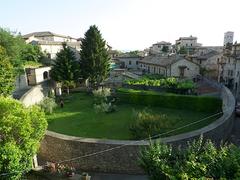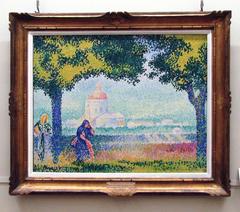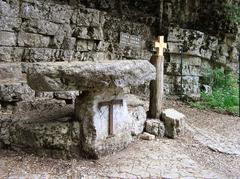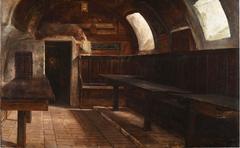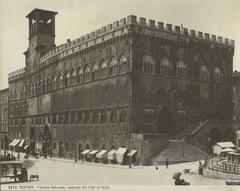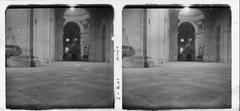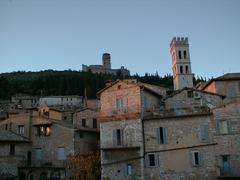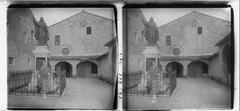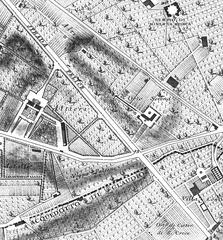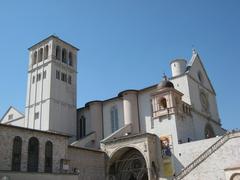Sanctuary of Rivotorto: Complete Guide to Visiting Hours, Tickets, and Travel in Assisi
Date: 15/06/2025
Introduction
The Sanctuary of Rivotorto, located just south of Assisi in the scenic Umbrian countryside, is a cornerstone of Franciscan history and an essential pilgrimage site for spiritual seekers, history enthusiasts, and travelers interested in Assisi’s rich medieval heritage. Here, St. Francis of Assisi and his first companions embraced lives of poverty, humility, and service—ideals that would ignite one of Christianity’s most influential movements. Today, the sanctuary preserves this legacy within a 19th-century neo-Gothic church, offering a space for reflection, discovery, and inspiration.
This guide provides detailed information on the sanctuary’s history, religious and artistic significance, practical visitor information—including visiting hours, tickets, accessibility—and travel tips to help you plan your journey. For further details, consult trusted resources like Umbria Tourism, Key to Umbria, and Earth Trekkers.
Historical and Spiritual Significance
Origins and the Life of St. Francis at Rivotorto
The Sanctuary of Rivotorto is intrinsically linked to the early years of St. Francis of Assisi. Around 1208–1209, Francis and his first followers, including Bernard of Quintavalle and Peter of Catanio, inhabited a simple stone hut—known as the “sacro tugurio”—beside a twisting stream (“rivo torto”) (Wikipedia). Here, they dedicated themselves to prayer, manual labor, and service, especially to the marginalized such as lepers at the nearby hospice (Key to Umbria). It was in Rivotorto that Francis drafted the first version of the Franciscan “Form of Life”—a rule that would define the order’s ethos (Christ Desert). In 1209, the companions traveled from Rivotorto to Rome to seek papal approval (My Catholic Pilgrimages).
The Sacro Tugurio: Structure and Symbolism
The original stone hut, reconstructed and preserved within the sanctuary, features three modest rooms: the right as a dormitory, the left as a kitchen, and the central room now serving as a chapel (Key to Umbria). The sacro tugurio remains a powerful symbol of Franciscan humility and poverty. Above the main entrance, the Latin inscription “Hic primordia Fratrum Minorum” (“Here the beginnings of the Friars Minor”) underscores the site’s foundational importance (Umbria Tourism).
Development and Artistic Heritage
Sanctuary Architecture and Restoration
Due to increasing veneration, a protective chapel was first built around the sacro tugurio in 1455 (Wikipedia). After an earthquake in 1853, the current neo-Gothic sanctuary was constructed between 1860 and 1880, with a restrained façade, pointed arches, and a rose window (Key to Umbria). The three-nave interior is simple yet dignified, focusing attention on the central tugurio (Umbria Tourism).
Frescoes, Panels, and Commemorative Art
The sanctuary houses twelve painted panels by Cesare Sermei (1653), depicting the lives of St. Francis and his companions. Other notable artworks include a painting of Saint Michael the Archangel by Domenico Mattei and a 15th-century communion altar. Outside, Fiorenze Bacci’s 2001 bronze statue of St. Francis washing a leper honors his compassionate outreach (Wikipedia; Umbria Tourism).
Visitor Information
Visiting Hours and Admission
- Opening Hours:
- Monday–Saturday: 7:00 am–12:15 pm; 2:30 pm–7:15 pm
- Sunday: 7:30 am–12:15 pm
- Hours may vary on religious holidays or special events.
- Tickets: Free entry; donations are welcome.
- Accessibility: The sanctuary is wheelchair accessible with ramps. Some historic areas may have limited access.
- Photography: Permitted without flash; please be respectful, especially near the sacro tugurio.
- Guided Tours: Available by request or via local tour operators, often as part of Assisi’s Franciscan itineraries (Evendo).
Getting There
- By Car: Ample parking is available; the sanctuary is about 4 km (10 minutes) from Assisi’s center.
- By Bus: Line 5 from Assisi or Santa Maria degli Angeli.
- On Foot/Bicycle: A scenic countryside route, approximately 40 minutes on foot.
- Taxi: Readily available from Assisi.
Dress Code and Etiquette
As an active place of worship, visitors should dress modestly (shoulders and knees covered) and maintain a respectful silence within the sanctuary.
Nearby Attractions
Enhance your pilgrimage by visiting these nearby Franciscan landmarks:
- Basilica of St. Francis of Assisi
- Porziuncola Chapel at Santa Maria degli Angeli
- San Damiano Church
- Eremo delle Carceri (Hermitage)
- Assisi’s medieval town center and the Basilica of St. Clare
These sites are connected by well-marked pilgrimage paths, offering opportunities for spiritual reflection and exploration of Assisi’s UNESCO-listed heritage (Umbria Tourism).
Cultural and Artistic Highlights
- Neo-Gothic façade with rose window and historical inscription
- Central nave enshrining the original sacro tugurio
- Twelve narrative panels by Cesare Sermei
- Modest yet evocative frescoes and stained glass
- Life-sized devotional statues, including St. Francis at rest
- Peaceful gardens and outdoor pilgrimage routes
Alt text for images: “Sanctuary of Rivotorto visiting hours” and “Assisi historical sites.”
Frequently Asked Questions (FAQ)
Q: What are the Sanctuary of Rivotorto visiting hours?
A: Monday–Saturday: 7:00 am–12:15 pm, 2:30 pm–7:15 pm; Sunday: 7:30 am–12:15 pm. Hours may vary on holidays.
Q: Is there an entry fee or ticket required?
A: No, entry is free; donations are appreciated.
Q: Is the sanctuary accessible for wheelchairs?
A: Yes, ramps are provided, though some historical spaces have limited access.
Q: Are guided tours available?
A: Yes, by advance request or through local tour operators.
Q: Can I take photos inside the sanctuary?
A: Yes, discreet photography is allowed; avoid flash and respect the sacro tugurio.
Travel Tips
- Best Time to Visit: Early morning or late afternoon for tranquility and optimal lighting.
- Dress Appropriately: Modest clothing is required.
- Combine with Other Sites: Plan a full day to explore the Franciscan network of Assisi.
- Local Amenities: Gift shop, restrooms, and picnic areas available; nearby Rivotorto village and Assisi offer dining options (Wanderlust Storytellers).
Additional Resources
- Umbria Tourism: Sanctuary of Rivotorto
- Key to Umbria: Santa Maria di Rivotorto
- Assisi Official Tourism
- Sanctuary of Rivotorto Official Page
- Earth Trekkers’ Assisi Guide
- Vagrants of the World: Assisi
- Amo Italy: Rivotorto
Conclusion
The Sanctuary of Rivotorto is a profound testament to the humility, simplicity, and spiritual passion that shaped the Franciscan movement. From its preserved stone hut to its evocative neo-Gothic church and peaceful gardens, Rivotorto offers visitors a rare opportunity to connect deeply with Assisi’s religious heritage. With free admission, accessible facilities, and proximity to other Franciscan landmarks, it stands as both a place of pilgrimage and a cultural treasure.
Plan your visit today to experience the Sanctuary of Rivotorto firsthand. Download the Audiala app for up-to-date information, audio guides, and travel tips, and follow us on social media for the latest news and special events.
References
- Sanctuary of Rivotorto: History, Visiting Hours, and Guide to a Key Assisi Historical Site, Key to Umbria
- Sanctuary of Rivotorto: Visiting Hours, Tickets & Historical Insights in Assisi, Vagrants of the World
- Architectural Features and Art, Amo Italy
- Visitor Experience, Earth Trekkers
- The Sanctuary of Rivotorto and the Historical Landscape, Umbria Tourism
- Sanctuary of Rivotorto, Wikipedia
